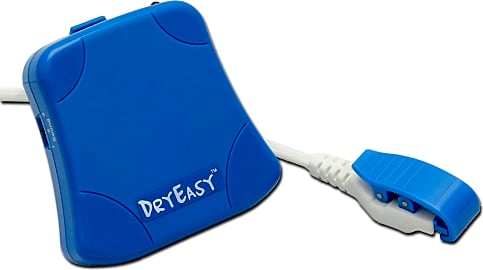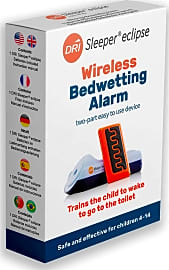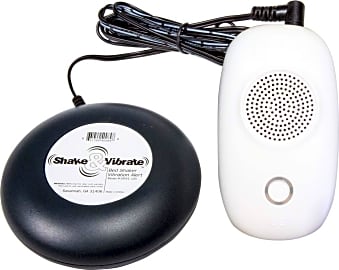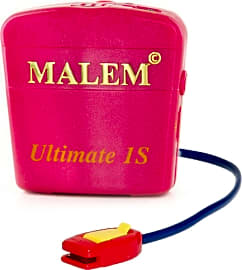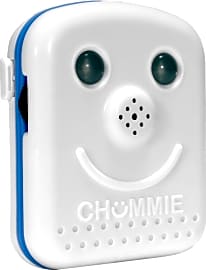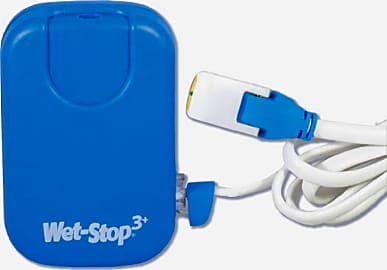The 8 Best Bedwetting Alarms

This wiki has been updated 35 times since it was first published in October of 2016. So your little one has graduated from diapers, but still has nighttime accidents occasionally? Technology may be the answer. These bedwetting alarms and monitors awaken your child at the first detection of urine and rapidly train youngsters — even deep sleepers — to wake up before the urge to go causes a major problem, saving both of you some awkward midnight sheet changes. When users buy our independently chosen editorial selections, we may earn commissions to help fund the Wiki.
Editor's Notes
May 05, 2020:
Bedwetting can be a pretty complicated process, with causes ranging from the physical to the psychological, and with the latter often coming into play regardless, due to the shame and fear that can accompany the condition. To that point, these devices might not prove to be a silver bullet, but should be considered part of a holistic approach toward reducing incidents of bedwetting that should also include limiting liquid consumption close to a consistent bedtime and as much positive reinforcement as possible.
For all of that to be successful, however, it'd help to have an alarm you can rely on. That's why we got rid of the Teqin Alert, for example, as its battery life was poor enough that you couldn't be sure it would work on a given night. And the Nytone Alarm had vibration settings that were too soft to be effective on moderate to deep sleepers.
Comfort can be a big issue, as well, with the cable connecting the sensor to the alarm itself often being the most annoying piece of the puzzle. That's why we added another wireless offering — in addition to the DryBuddy Flex 3 — in the DRI Sleeper Eclipse. Its alarm siren sits on your child's night stand, so there's only the sensor itself to contend with for comfort.
Special Honors
Gogo Band This innovative device utilizes bioelectric sensors and predictive algorithms to anticipate when your child is about to have an accident and wake them up before it begins. It might take a few nights to learn your child's habits and physiology, but when it's working properly it will gently wake them up while also sending an alert to your smartphone, so you can make sure they're on their way to the bathroom. mygogoband.com
Causes Of Bedwetting
Sleep apnea and diabetes are also common causes, so if the condition persists, talk to your doctor about running some tests.
We've all done it at one time or another. Of course, waking up to find the sheets soaked can be extremely embarrassing, regardless of what age you happen to be at the time.
While it's normal behavior for kids under age seven, that doesn't make it any easier to deal with. If it lasts much longer than that, though, or if it becomes a problem again as an adult, you should probably consult your doctor, as there might be more going on than you realize.
One of the biggest causes of a wet bed is a person's inability to recognize when their bladder is full. As a result, they won't wake up in the middle of the night to urinate, and so the problem just...solves itself. This is especially true for really deep sleepers, which is why an alarm can be so helpful.
In addition to using an alarm at night to wake them up when they start to lose control, you can also help the situation along by teaching them to pay attention to their bladders while they're awake. This will build the nerve connections that trigger a need to urinate, and hopefully help solve the issue.
Your child may also just have a small bladder. Not all kids' bodies develop at the same rate, so they may just be dealing with a smaller tank than their peers. If that's the case, the child will likely need to go to the bathroom more during the daytime, as well.
There are other medical ailments that could be pressing the issue. Bedwetting is common among children with ADHD. Sleep apnea and diabetes are also common causes, so if the condition persists, talk to your doctor about running some tests.
Another often-overlooked reason that bedwetting occurs is due to stress. If your child has recently gone through a difficult or traumatic experience, it may trigger the condition, so be ready to ask some questions and even consult a professional if needed. Unfortunately, wetting the bed usually brings up feelings of shame and embarrassment, which can exacerbate the problem.
Getting to the root of the issue is important, and before you understand it, you likely won't be able to solve it. Luckily, most of these things are treatable, so your child can wake up every morning in sheets that are dry as a bone — and you can stop having to do laundry every day.
How Bedwetting Alarms Work
It may sound counter-intuitive. Your child is sound asleep, dreaming about how much they love you, when a tiny bit of urine dribbles out of their full bladder — which then causes a loud alarm to sound. Why, it's enough to scare the — well, it sounds like it could make the problem worse, is all.
The basic idea is this: you place a special sensor in their bed or pajamas that's designed to detect moisture.
However, alarms are actually quite effective when used properly, especially if the problem is caused by the child sleeping too deeply to realize they need to go to the bathroom, or if they've yet to build the proper nerve connections between their bladders and brains.
The basic idea is this: you place a special sensor in their bed or pajamas that's designed to detect moisture. The instant your child begins to empty their bladder, an alarm or bell goes off, waking them up and alerting them to the fact that they need to use the bathroom.
The first few weeks you use it, chances are the alarm will wake you up instead of your kid. In that case, you'll need to quickly wake your child up and escort them to the toilet, where they can finish their business.
Over time — usually about 4-6 weeks — the kid will learn to acknowledge the buzzer, and they'll get up and take care of the issue on their own. While doing this, they're also training themselves to become aware of the sensations of bladder fullness, even if they're in the deepest part of their sleep cycle.
The treatment usually takes about 12 weeks or so to see results. Once your child has stayed dry for three straight weeks, keep using it for another two, and then stop. If the problem goes away, great. If not, you can start back over from scratch.
It's by no means a quick fix, but it can be an effective remedy if nothing else has worked — and it prepares them for a lifetime of having their lives governed by shrill, annoying alarms.
Other Strategies For Beating Bedwetting
If you've eliminated as possibilities all of the medical conditions that could be causing bedwetting, there are a few other strategies you can try to defeat the issue once and for all.
Make sure their siblings don't tease them; instead, encourage any progress or effort that is made.
The first, and most obvious, is to limit the amount of liquids consumed before bed. It's hard for anyone to down a big bottle of water before going to sleep and then make it through the night, much less a child with a still-developing body. Caffeinated beverages are especially troublesome, so try to cut your kid off before their third cup of coffee.
Regardless of how much they drink, make sure they use the facilities before getting tucked in. Double voiding is a smart strategy, and it involves making them attempt to go at the beginning of their nighttime routine, and then again as the last thing before getting in bed.
Stay vigilant all through the day, as well. Encourage them to go regularly, such as every two or three hours, even if they don't feel like they need to. This will cause them to grow accustomed to regular bathroom use, as well as preventing any feelings of urgency.
Also, fixing the problem is a marathon, not a sprint, and the worst thing you can do is berate them or make them feel embarrassed about the condition. Make sure their siblings don't tease them; instead, encourage any progress or effort that is made.
With a little love and support, your child can quickly put the problem behind them.


